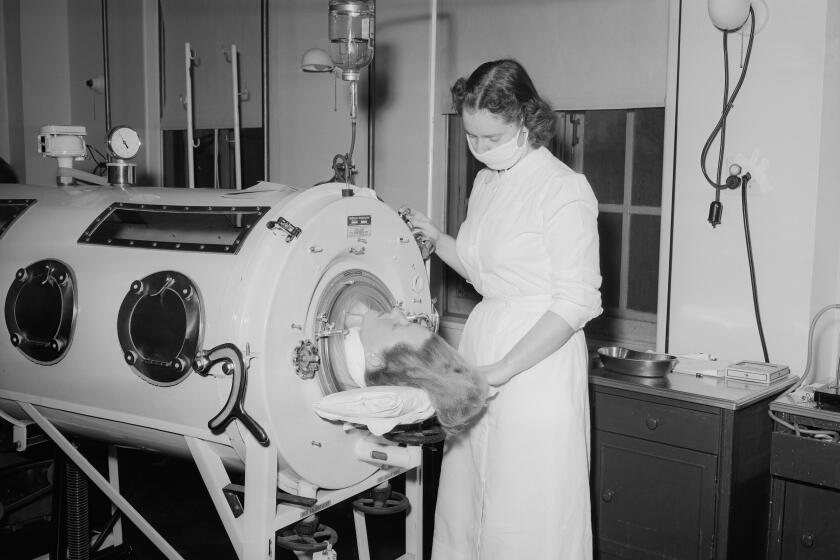Opinion: My son has autism. His life tells a story RFK Jr. ignores

- Share via
Among President-elect Trump’s unconventional Cabinet choices, the potential appointment of one in particular worries me: Robert F. Kennedy Jr. as secretary of Health and Human Services.
RFK Jr. has long espoused anti-vaccine views, and they are promoted by his nonprofit Children’s Health Defense. During his presidential campaign, he repeated thoroughly debunked claims that vaccines cause autism and other neurodevelopmental conditions. He also caricatured persons with autism as “walking around … with helmets on … non-toilet-trained, nonverbal, stimming, toe-walking, hand-flapping.”
With his inaccurate stance that vaccines should be avoided to prevent autism, Kennedy suggests that chancing severe childhood diseases would be preferable to a life like my son’s. Diagnosed at age 1 with a rare seizure disorder that stalled his cognitive development, and later with intellectual disability and autism, my son today is a smart, charming 25-year-old with a great sense of humor. He’s exploding with independence and has cultivated passions of his own: lawn mowing and country music, to start with.
An advisor to Donald Trump’s pick for Health and Human Services, Robert F. Kennedy Jr., petitioned the government to withdraw approval of the polio vaccine.
Years ago, when my son turned 8, his teacher told me there was an active Special Olympics program in our community. He loved basketball and I quickly signed him up. He made allies, including his taller, gray-haired 60-something teammate who would expertly pull down a rebound and hand him the ball to make his shot. By the end of the season the team had a couple of tournaments scheduled. The coach’s wife measured my son and presented him with a shiny purple uniform.
But at the first tournament game, I learned that what to my family looked like a successful team could be distorted into a different message.
We were losing badly; the other team handed the ball back to our 30-year-old point guard who shot, missed; the other team rebounded and handed it back again. This repeated until we scored. Then uncontrolled joy broke out, pumped fists raised heavenward, sweaty high fives swatted.
There’s a lot to take in at an event like that — intellectual and developmental disability in all its expressions, amid the general chaos of amateur sports. There’s limping, shuffling, unruly hairstyles, broken teeth, body odor, poorly fitting glasses, uniforms slipping down or up untended.
Though these aspects may have been perceived as a cry for care, medical attention or grooming, they really told a universal truth: Things break. People sweat. Clothes can be enemies, depending on the functions of bodies and minds. Some of these things will be tended to in time; others don’t need to be fixed.
The elderly couple I was sitting next to saw it differently. I was close enough to hear when the man bent toward the woman’s ear. “We’ve been so blessed,” he said, shaking his head. “All our children and grandchildren are healthy and normal.”
Many of us with disabled children have heard others count this blessing: Thank you for my health. Translation: Thank you for keeping me normal. Thank you for keeping me and my children and grandchildren off this basketball court today. Thank you for keeping me out of that hospital room, this nursing home. Thank you for anointing me, for choosing me, for blessing me. It’s this normal-at-all-costs viewpoint that Kennedy has reinforced with his language and positions about autism.
Autistic people and their families say they can’t find adequate help in their communities before they reach a crisis point.
What this view misses is that disabled people can and do lead lives of dignity and self-determination. Real health leadership does not, cannot, mean complete avoidance of disability, or treating it as a fate worse than a deadly infectious disease. Instead, it means creating a world that supports and accepts those with disease or disability.
Our family has been unspeakably enriched by our life with my son. We’ve delighted in his accomplishments that have been very different from those of his neurotypical sister. And while it’s not fair to my son to imbue him with mystical abilities — or ignore that he and his peers, and by extension our family, face very real challenges in a world not fully equipped to accommodate them — we’ve experienced him as a bearer of joy.
In his wonderful book “Far From the Tree,” Andrew Solomon explores parents who have had children very different from themselves and, by and large, have found beauty and meaning in parenting their exceptional child. “Difference unites us,” writes Solomon. “To be entirely typical is the rare and lonely state.”
Americans deserve a Health secretary who would embrace these realities and work to improve the lives of all children and citizens. This would not mean blindly accepting all proposed vaccines without question, but rather strengthening the scientifically rigorous clinical testing process that has already worked to vaccinate millions of Americans and end numerous childhood diseases of the past. A strong leader would help return a conspiracy-vulnerable populace to faith in the scientific system. This person would dissuade President-elect Donald Trump from mocking people with disabilities and instead help people like my son find meaningful employment and safe and affordable housing.
Pursuing disability inclusion is, in fact, one of the Kennedy family’s most important legacies, seen in their work with Special Olympics and other initiatives. Ignoring this legacy to enact a narrow and dangerous Make America Healthy Again agenda would be a shameful move at the expense of a valuable group of Americans: people like my son and his peers.
Susan Hall is a writer in Michigan.
More to Read
A cure for the common opinion
Get thought-provoking perspectives with our weekly newsletter.
You may occasionally receive promotional content from the Los Angeles Times.












